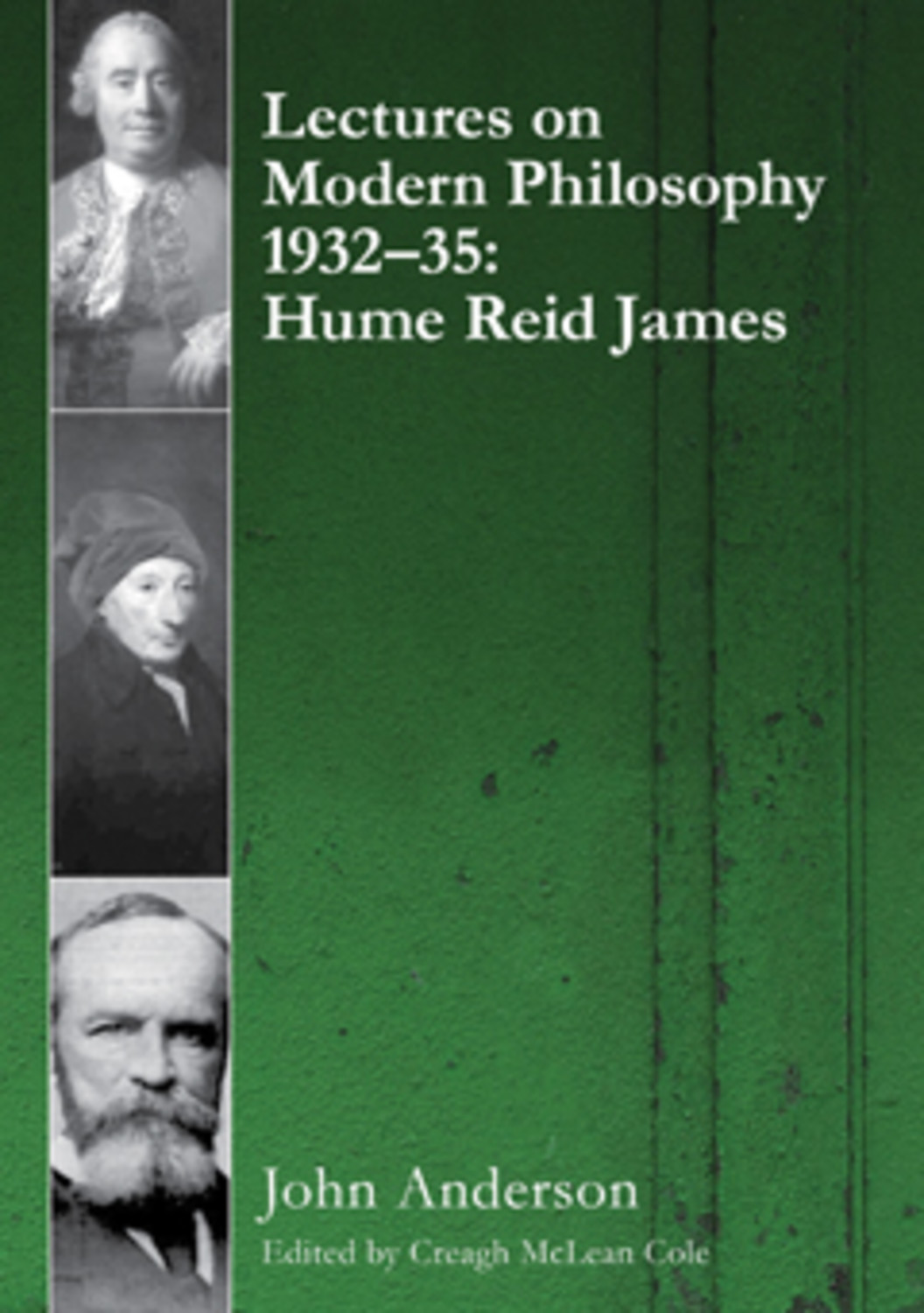
These lectures from the 1930s on David Hume, Thomas Reid and William James trace the development of John Anderson's empirical realism, helping to distinguish his position from "English" empiricism, Scottish commonsense and direct realism, radical empiricism and pragmatism. They also demonstrate Anderson's approach to the study of the history of philosophy.
The lectures on David Hume place Anderson in direct opposition to his teacher and colleague at Edinburgh, Norman Kemp Smith, who heavily influenced the direction of Hume studies in the twentieth century. The lectures on Thomas Reid are unique in Anderson's works in addressing this seminal figure in the Scottish philosophical tradition, providing background reflections upon his own theory of mind as feeling, and arguing for the critical importance of Freud for contemporary philosophical realists. The lectures on William James offer a final accounting with this major American influence on Anderson's early philosophical development.
For Anderson there can be no reconciliation between rationalism and empiricism. The view of the development modern philosophy as an emerging synthesis of these competing epistemological positions must be rejected. Rationalism is a persistent source of philosophical error and the philosophies of the so-called "empiricists" are fundamentally weakened by their rationalist assumptions. The very idea of providing a foundation for knowledge in notions of self-certainty represents an inherently rationalist project and must be rejected by any truly empiricist philosophy.
John Anderson was the Challis professor of philosophy at the University of Sydney from 1927 to 1958.
Foreword to the John Anderson series
Introduction
Note on the text and abbreviations
Lectures on David Hume 1932
1. Introductory: Hume and his predecessors
Lecture 1: rationalism and empiricism
Lecture 2: simple impressions, complex states of affairs
Lecture 3: knowledge of ideas, knowledge of things
Lecture 4: Berkeley’s theory of abstraction
Lecture 5: kinds of existence
2. Hume’s treatise and the theory of ideas
Lecture 6: impressions and ideas
Lecture 7: impressions and ideas continued
Lecture 8: theories of truth
Lecture 9: inconsistencies in Hume
Lecture 10: memory and imagination
Lecture 11: space and time
Lecture 12: ideas of external existence
Lecture 13: ideas of external existence continued
3. Knowledge and probability in Hume’s treatise
Lecture 14: Hume’s philosophical relations
Lecture 15: causal relations
Lecture 16: causal relations continued
Lecture 17: causal relations continued
Lecture 18: causal relations continued
Lecture 19: causal relations continued
Lecture 20: causal relations continued
4. Hume’s dialogues concerning natural religion
Lecture 21: argument from design
Lecture 22: Cleanthes’ argument
Lecture 23: occasioned and contrived – totality
Lecture 24: totality continued
Lecture 25: the incoherence of scepticism
Lectures on Thomas Reid’s Inquiry 1935
1. Introductory: Reid and his predecessors
Lecture 1: Reid and the Scottish Englightenment
Lecture 2: Ferrier on Reid
Lecture 3: Cartesian without the cogito
2. Reid on sensations and external things
Lecture 4: Reid and Cleanthes; the sense of smell
Lecture 5: sense of smell continued
Lecture 6: sensations and bodies
Lecture 7: vision and appearance
Lecture 8: vision and appearance continued
Lecture 9: vision and appearance continued
3. Reid on knowledge of mind: mind as feeling
Lecture 10: Descartes dual theory of truth
Lecture 11: other minds – the Freudian unconscious
Lecture 12: sense organ theory of knowledge
Lectures on William James 1935
1. Introductory: James on relations
Lecture 1: James and his predecessors
Lecture 2: James and his predecessors continued
Lecture 3: the question of relations
Lecture 4: the question of relations continued
Lecture 5: the rationalism of Kant
2. James principles of psychology and radical empiricism
Lecture 6: James on necessary truths
Lecture 7: necessary truths continued; pure experience
Lecture 8: pure experience continued
3. James’ A Pluralistic Universe
Lecture 9: types of thinking
Lecture 10: types of thinking continued
Lecture 11: pluralism abandoned
Lecture 12: monism and pluralism
Lecture 13: monism and pluralism continued
Lecture 14: James and Hegel
Lecture 15: James and Bergson and Zeno
Lecture 16: James account of reality as changing; James’ conception of practice
Lecture 17: James conception of practice continued
Appendix: lectures appended to Lecture 11
Index
Size: 210 × 148 × 19 mm
266 pages
ISBN: 9781920898861
Publication: 08 Apr 2008
